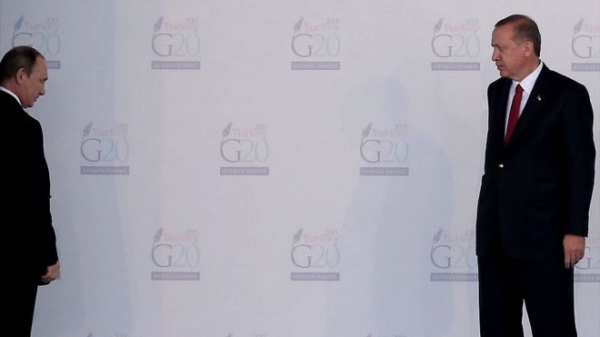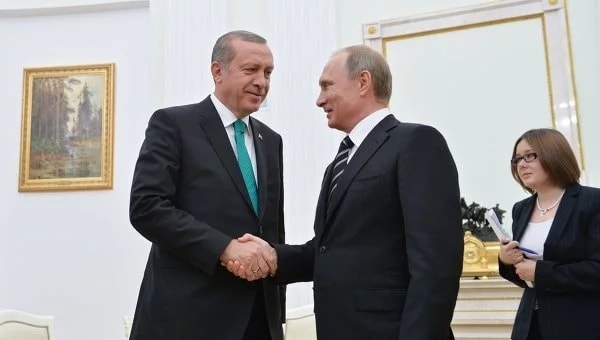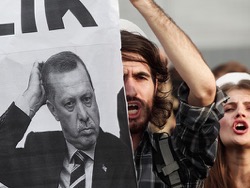
Turkish “apology” Russia: more than meets the eye.
The great German statesman Otto von Bismarck said that “politics is the art of the possible”. From this point of view, the melting ice in the Russian-Turkish relations was only a matter of time. Moscow and Ankara share the economic and geopolitical interests. The crisis in bilateral relations has erupted because of the fact that the planes of the Turkish air force shot down a Russian su-24 bomber. The Turkish position on this incident has undergone numerous changes. First, President Recep Tayyip Erdogan said that Turkey has every right to defend its airspace, and is not going to bring Russia an apology. Later, several Turkish officials said that the military didn’t know what we are talking about the Russian bomber, as it was unable to establish communication with the pilots. At the same time, the Kremlin has formulated a clear position, which has been consistently voiced by officials and state media.
The President of Russia Vladimir Putin ordered to impose sanctions against Turkey. In particular, the Russian travel agencies were forbidden to sell tours in Turkey introduced visa restrictions, restricted the activities of Turkish businessmen and, finally, banned the import of many Turkish products. The Russian President said that Moscow is ready for dialogue with Turkey upon several conditions: the Turkish side needs to apologize for the incident, pay compensation to the victim’s family of a military pilot and to bring to justice those responsible for his death. President Erdogan has long refused to accept these conditions and insisted on the legality of the actions of the Turkish aircraft. Meanwhile, the Russian sanctions have caused serious harm to the Turkish economy. Most of all affected the banking sector and tourism. As reported by Bloomberg, has significantly increased the share of overdue Bank loans, and the share of non-performing loans grew by 3.18%.
Slide Turkey into debt led to the resignation of an old colleague of Erdogan, Prime Minister Ahmet Davutoglu. Although Davutoglu said that he was leaving as head of the government on their own, many experts believe that the resignation was a signal of readiness to negotiate with Moscow. After his resignation, erdoğan first stated that the resumption of dialogue with Russia is very important. But Moscow still insisted on compliance with the mentioned requirements. For Erdogan, who in decision-making is often guided by emotions, rather than pragmatic considerations, the apology was unacceptable. In addition, he believed that may have an impact on the migrant crisis in Europe.
Europe has decided in response to teach Ankara a lesson in political humility. The German Bundestag overwhelmingly supported a resolution on the recognition of the Armenian genocide. Britain expressed its readiness to do likewise, and the Vatican has announced the official opening of the archives containing documents about those events. Europe has not allowed Ankara to lead the game. Turkey was left with no choice but to improve relations with Russia.
On 27 June, the press Secretary of the President of Russia Dmitry Peskov said that Erdogan had sent Putin a letter of apology. Erdogan wrote that I would like to inform the family of the deceased pilot that he shared their pain and brings his condolences: “Please forgive us”. Moreover, the case against the alleged killers of a Russian military reopened. At first glance it seems that Erdogan has fulfilled the requirements of Russia. But many experts noted that his letter contained no apology to the Russian government. In addition, the Prime Minister of Turkey Binali Yildirim said that to compensate for the downed plane Turkey does not intend. Presumably, the Turkish side is ready to discuss only compensation to the relatives of the deceased pilot, but not reparations to Moscow.
In other words, Turkish diplomacy outwitted the Russians. Turkey has fulfilled enough requirements to Moscow was pleased, but not concessions which might seem weak. Moscow, meanwhile, has lifted a ban on tourist visits and withdrew from Turkey.
Moscow and Ankara have been looking for ways to reconcile, to compromise not to affect the image of any of the parties. The letter of Erdogan to Putin was very successful. Moscow believes that the message contains an apology, as Ankara has avoided the loss of reputation. Now Turkey should restore economic relations with Russia and to take part in the Syrian peace process.
Areg Galstyan — PhD, his articles are often published edition of the Russia in Global Affairs, and Forbes.








